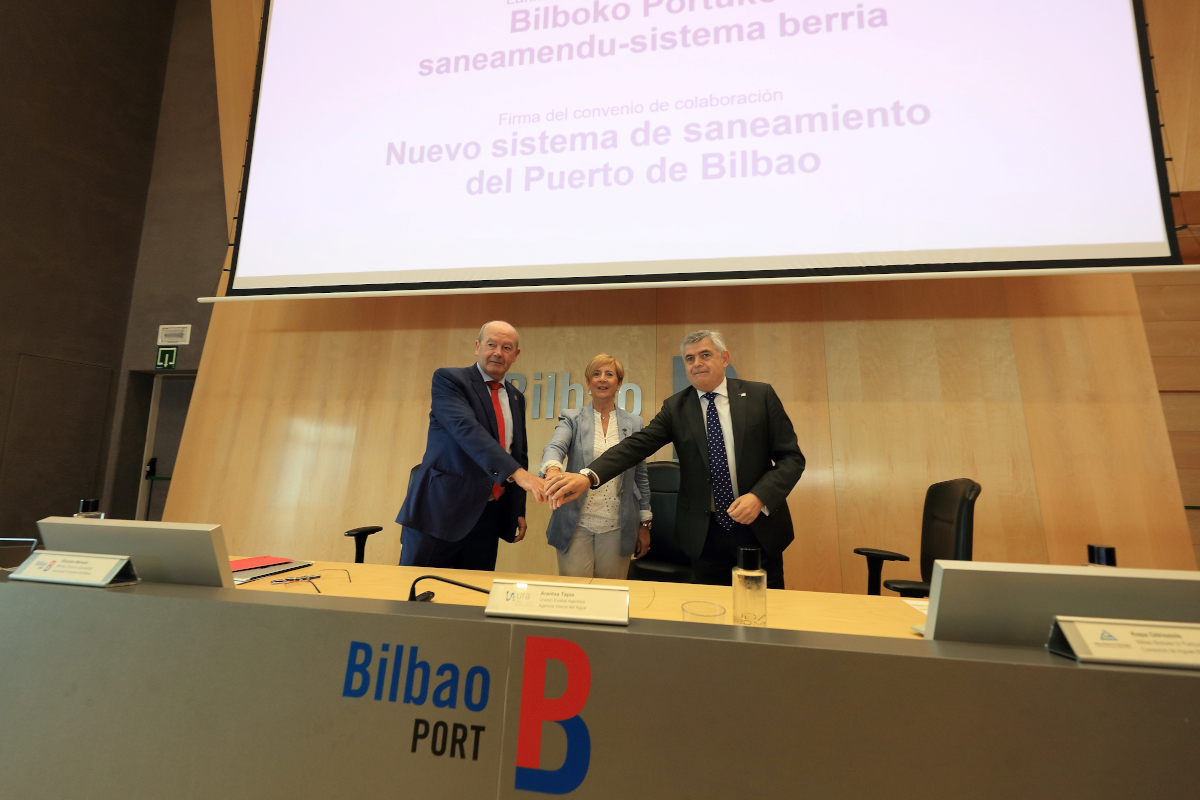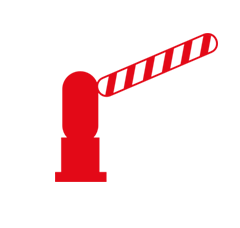- An agreement was signed today setting out the conditions for the financing, tendering, execution and management of the works, as well as the future maintenance and operation of the sewer system.
- Total investment will exceed EUR 20 million and will mostly be covered by URA and the Port Authority. The project will be part funded by the EU through the Recovery, Transformation and Resilience Plan (Next Generation EU), and the Consortium will take active part in the design and roll-out of the project.
The Basque Water Agency (URA), the Port Authority of Bilbao and the Bilbao Bizkaia Water Consortium will construct the new sewer system for the port of Bilbao. This new system will replace the numerous existing sewage treatment plants scattered throughout the port area, with a network of collectors that will transport sewage and industrial water to the Galindo Wastewater Treatment Plant (WWTP), managed by the Bilbao Bizkaia Water Consortium. In this way, the only wastewater to be discharged into the sea will be rainwater and cooling water, the polluting potential of which will be lower.
Such is the commitment of the three organisations which, at an event held today in the port of Bilbao, have co-signed an agreement setting out the conditions for the financing, tendering, execution and management of the works, as well as the future maintenance and operation of the sewer system. The signing ceremony was presided by Arantxa Tapia, President of URA and Basque Government Minister for Economic Development, Sustainability and the Environment; Ricardo Barkala, President of the Port Authority of Bilbao; and Kepa Odriozola, President of the Bilbao Bizkaia Water Consortium.
This ambitious clean-up project will require a total public investment of some EUR 20 million, mostly covered by URA and the Port Authority. The project is also part-funded by the European Union through the Recovery, Transformation and Resilience Plan (Next Generation EU).
URA will tender, execute and begin the works of the project that the Consortium will have previously designed and drafted. Furthermore, in addition to collaborating in its financing, the Consortium will contribute its know-how in terms of the tendering process, overseeing the construction works and the commissioning of an infrastructure that it will later be responsible for managing.
This collaboration agreement paves the way for inter-institutional cooperation to provide a fully integrated wastewater treatment solution for the entire port area. In other words, a solution which encompasses and eliminates 120 discharge points; intercepts and discharges wastewater at a single point of the port interceptor, for an area of activity which exceeds 300 ha and which is expected to generate an estimated global discharge equivalent to that of 19,000 inhabitants in the coming years, with an average of 200l/inhabitant/day.
The planned solution is a vacuum sewer system: a wastewater collection system that differs from common sewer systems that use gravity or pressure to remove wastewater. This vacuum system is to be built on a size and scale which is unprecedented in the Basque Country. Basically, at source, the wastewater is channelled by gravity to drainage manholes, then conveyed by vacuum to a vacuum station from where it is finally pumped to the treatment plant.
The sewer infrastructure that the three organisations have agreed on will be designed in such a way as to be capable of servicing future demands. Any activity that may be set up at some time in the future in the port of Bilbao will be able to connect to the sewer infrastructure. To this end, the system will be designed for annual discharge volumes of up to 1.4 million m³, with an average flow of around 45 l/s and peak flows of up to 70 l/s.
A staged approach
Due to the extension works in the port of Bilbao, the construction of the new sewer system planned for all the port areas within the municipalities of Santurtzi and Zierbena has been divided into three stages.
Firstly, the Santurtzi Docks and the Central Quay, the focal points of Stage 1 activity and work to install equipment for the collection and diversion of wastewater. These actions require a base tender budget of EUR 9.1 million, VAT included, and will be financed on a 50/50 basis by the Port Authority of Bilbao and the Basque Water Agency.
Secondly, additional works for wastewater collection and diversion in Stage 2 will be centred in the docks of the expansion area of the port. These works will require a base tender budget of EUR 9.3 million (VAT included), and will be financed on a 50/50 basis by the Port Authority of Bilbao and the Basque Water Agency.

Lastly, Stage 3 works will be performed in the industrial port area of the municipality of Zierbena, separated by the Zierbena port bridge. Under the current agreement, the three parties have undertaken to finance the drafting of the construction project required for the collection of wastewater from this third area, paying one third of the costs each. The base tender budget projected for this project is EUR 250,000, including VAT.
For Arantxa Tapia, President of URA and Basque Government Minister of Economic Development, Sustainability and the Environment, “a major step forward is being taken in the treatment and purification of wastewater, which will be treated at the Galindo WWTP, thus putting an end to the discharge of this water into the sea”. “Furthermore”, Tapia stressed, “infrastructure is being put in place that not only meets current sanitation needs, but also ensures a more sustainable and professional development and management of water for economic activities, as well as any future activities that may be undertaken in the port area”. She also confirmed that “the Basque Government and URA will continue to improve all-round water services management, tackling the current problem of inadequate infrastructure to reduce the number of direct discharges into rivers and the sea, and to strive to constantly improve the quality of wastewater that is directly discharged into rivers or the sea to ensure that our waters are in a good state of health”.
In the opinion of Ricardo Barkala, President of the Port Authority of Bilbao, “this project represents a major and groundbreaking step forward from an environmental perspective, thanks to the goodwill and collaboration of the three organisations involved. We’ve been taking improvements actions in this area for the last 10 years so, even though the baseline scenario in terms of land-sea discharges is already good, we believe it’s time to go one step further. Although we’ve been doing things well and in accordance with the regulations, we want to continue to be innovative and to be considered a port of reference in sustainable development and, in particular, with respect to this environmental challenge we are facing. We have the support of the EU, and the project will be put out to tender in the coming months and will be awarded before the end of the year”.
For the President of the Water Consortium, Kepa Odriozola, “through this clear and necessary example of inter-institutional collaboration, the actions we have agreed to take not only enable the different sources of discharge and pollution of the waters of the land-sea port to be diverted to the Galindo WWTP, but will also enable the sewer system to be scaled up and equipped to cope with the growth of the port in the coming years, with the arrival and setting-up of new companies and activities”.

 Port access
Port access